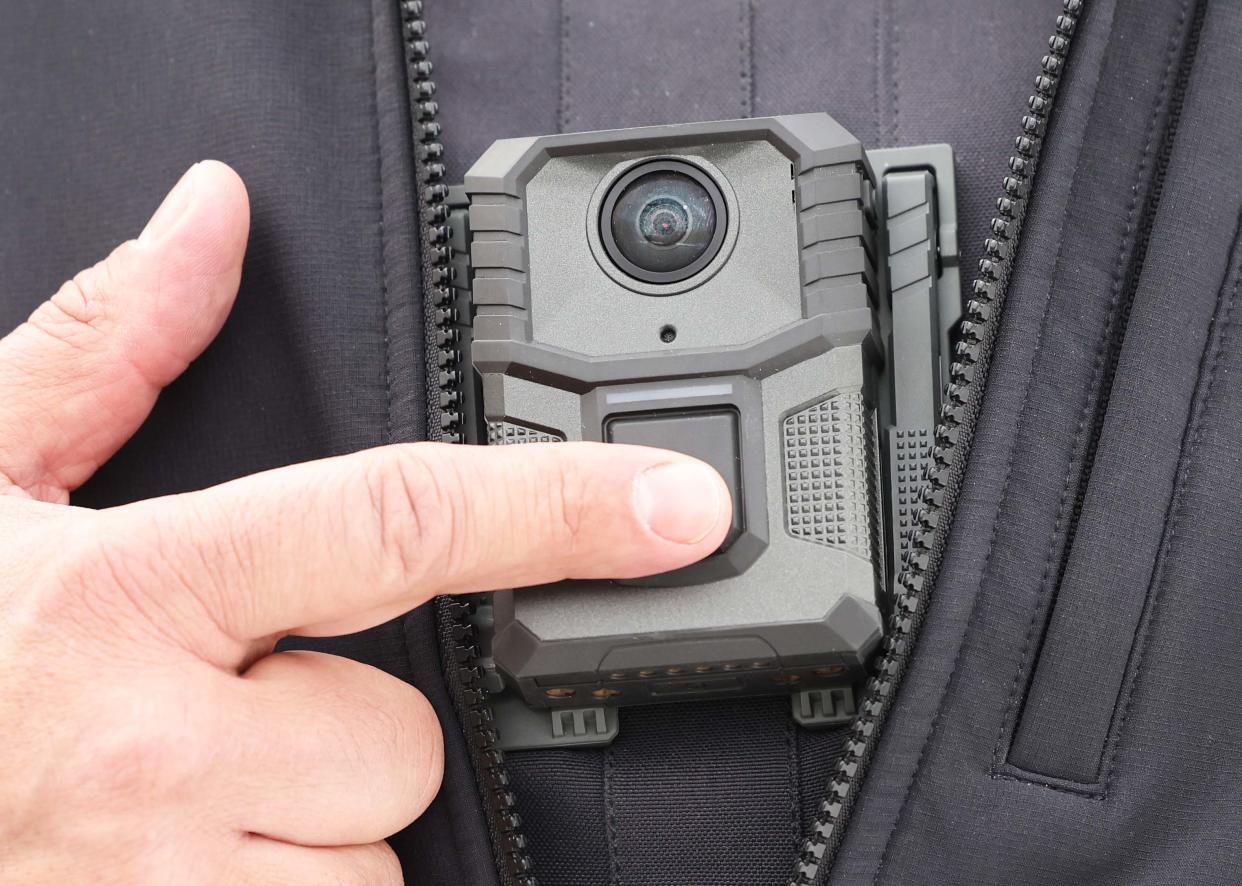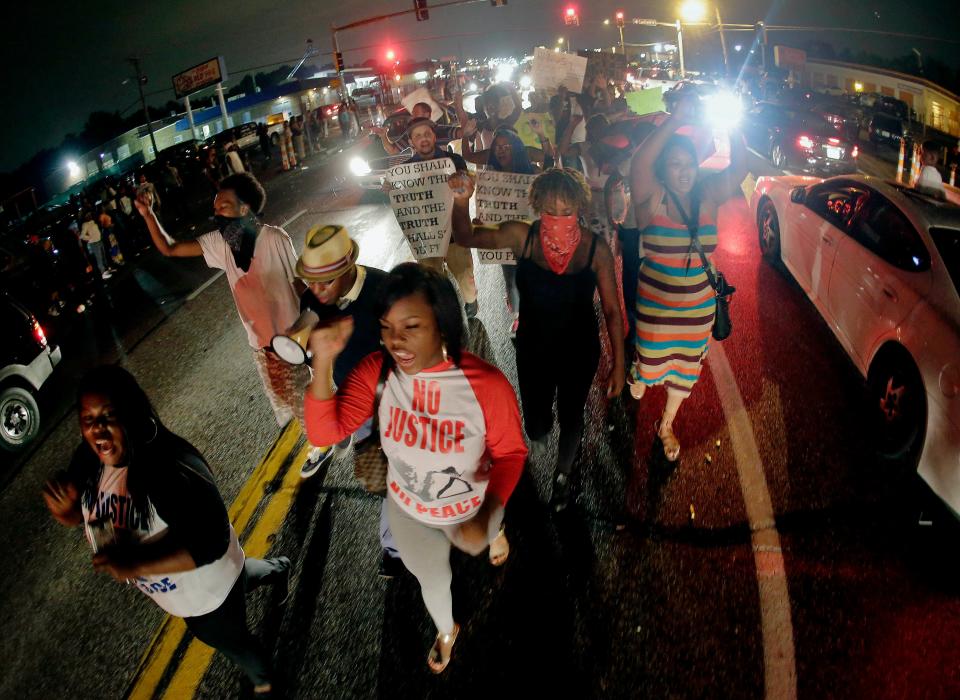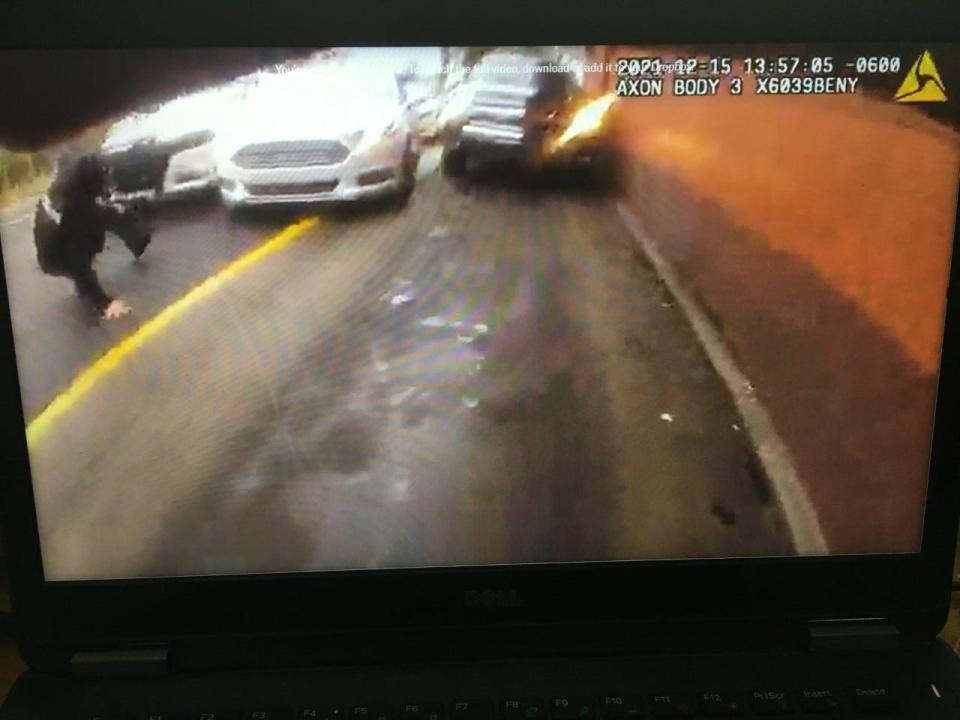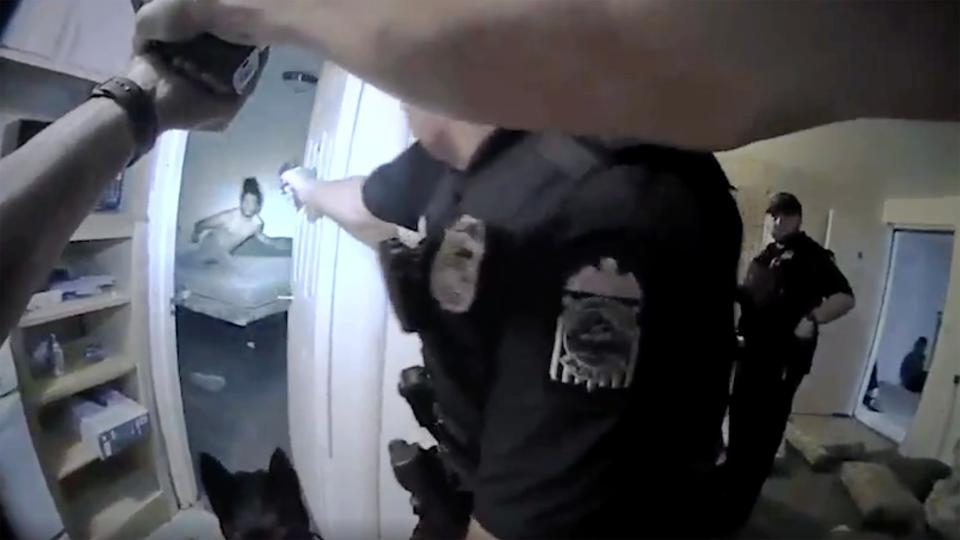Illinois is making local cops wear body cams. Here's what they think of it

Henry County's small-size municipal police departments are working to secure body cameras for their officers in an effort to meet the added requirements in the new Illinois' criminal justice law.
By 2025, just about anyone with a badge who works in law enforcement will be required to wear a body-mounted camera and record and save the officer's public, the result of a national debate over police use of force and accountability following several national high-profile suspect deaths at the hands of police dating back to 2014.
While departments are welcoming the additional evidence-producing cameras and say it improves law enforcement transparency, the technology is so new there still is uncertainty over consistency, funding, data storage, privacy and other issues.
The larger-town departments say the cameras have helped them do their jobs better and reduced complaints against officers, but small departments like Annawan wonder if they are necessary or if their towns can afford them.
"We already have in-car cameras," said Annawan Mayor Tim Wise. "It's a matter of the need for us as opposed to the expense. It's going to be a challenge for us."

Tools of the trade
Henry County police departments have had such success with body-cameras they almost sound like salesmen for the technology.
"Body cameras are one of the greatest new technologies that have come out, for police officers and the public," said Kewanee Police Chief Nicholas Welgat. "There's no more guessing who said what."
Kewanee's department adopted video technology for all of its officers in 2014 and already satisfy the requirements of the new state law.
In Kewanee, complaints against officers have gone down significantly and so has the amount of time wasted in court and investigating claims that turn out to be unfounded or unprovable.
"It kind of gets the process moving more efficiently because (defense attorneys) can go through (the video) with their clients beforehand," he said. "It makes everybody's life a little easier."
Henry County Public Defender Lance Camp says the cameras don't just help the police, they also help clients see how their interaction with police went in real time − something that didn't exist in the pre-video era. He said a body camera video can protect defendants because an officer misstep or outright abuse is captured for everyone to see.
"I really believe it's been a great benefit for all phases of the court system," Camp said. "It provides an unbiased, true account and everyone's held accountable."
The added bonus for a legal system already stretched to its limits with heavy caseloads: "Cases that don't need to go to trial, don't," he said. "If it's a simple case, it helps move through the system because everybody can see that overwhelming evidence."
And if video does prove police exceeded their authority, that has benefits, too.

"It protects the officers but it also gives them something to use for self improvement," he said.
Geneseo Assistant Chief Gene Karzin said his department started using body cameras around four years ago and the experience has been similar to Kewanee's.
"I've been in law enforcement for 38 years and way back when it was my word against your word," he said.
The technology keeps changing, but Karizn said there still are limitations for how video evidence can help a case. The weakness is that the camera is only from an officer's perspective and doesn't provide a "God's-eye" view of a scene, which means certain pertinent details could be absent.
Police have similar issues with fixed surveillance camera footage, the results of which can range from getting a closeup of a suspect's face or nothing at all depending on where the camera is aimed.
"In the end, I cant say (body camera evidence) leaves no doubt, but it's beneficial in that it gives us a better overall view of what happened," he said.
Work in progress
You know something's working when the police and the American Civil Liberties Union agree on an issue, and as far as the use of body cameras, they do, though for different reasons.
Police say the cameras protect them from false complaints and the ACLU says it protects defendants from police brutality.
"Although we at the ACLU generally take a dim view of the proliferation of surveillance cameras in American life, police on-body cameras are different because of their potential to serve as a check against the abuse of power by police officers," says a position statement on the ACLU website.
"Historically, there was no documentary evidence of most encounters between police officers and the public, and due to the volatile nature of those encounters, this often resulted in radically divergent accounts of incidents," says the statement. "Cameras have the potential to be a win-win, helping protect the public against police misconduct, and at the same time helping protect police against false accusations of abuse."
The ACLU admits that storage of raw digital recordings is problematic for departments, but has advocated for uniform rules that wouldn't depend upon officers turning the cameras on and off themselves. The argument is, any officer committing abuse wouldn't turn the camera on.
Like most of these systems, Kewanee's officer camera runs continuously, but it doesn't record continuously. When the officer turns the camera on during an arrest, the recording starts 30 seconds prior.
The ACLU says the practice of recording defendants also raises privacy issues.
"Police officers enter people's homes and encounter bystanders, suspects, and victims in a wide variety of sometimes stressful and extreme situations," the ACLU argues.
That was was the case in Kewanee in June this year when police released a video of a man who at one point threatened to kill himself with a knife and later injured an officer who tried to disarm him. The video's release was legal because the man was arrested in a public place (he was at a Kewanee gas station after it was alleged he passed a fraudulent check), but the Star Courier chose not to share it due to the man's obvious mental distress. (Other media outlets did share it).

The departments have developed policies governing when video should be used and what can be released publicly.
And while the cameras have seen success locally, a 2018 Bureau of Justice Statistics study on the use of body cameras said the data hasn't borne out that using the cameras improves arrest outcomes.
According to the BJS report, "the main reasons (about 80% each) that local police and sheriffs’ offices had acquired body-worn cameras were to improve officer safety, increase evidence quality, reduce civilian complaints, and reduce agency liability.
"Research does not necessarily support the effectiveness of body-worn cameras in achieving those desired outcomes. A comprehensive review of 70 studies of body-worn cameras use found that the larger body of research on body-worn cameras showed no consistent or no statistically significant effects."
The researchers looked at statistics involving use of force, citizen complaints, arrests and assaults on officers. Of the seven body-camera programs studied, five were rated "promising" and two were said to have had "no effects or even negative effects" on those outcomes.
On board
Henry County's smaller departments are being forced by the state to add the body cameras, but they believe in the local evidence and think there will be benefits.
Galva's department recently purchased cameras and equipment for its officers and Annawan's department is researching how best to meet the state requirements without breaking the bank. The new law doesn't take effect until 2025.
Galva Police Chief Kraig Townsend said he had purchased the equipment a month prior to the new law being passed after hearing of the KPD's experience.
"Their complaints against officers have been cut to practically none," he said. "I've had complaints on officers over the years and I just don't know what transpired. With this, if an officer has a traffic stop, it automatically puts it on our server."
Townsend said he shopped around for system components, purchased used cameras from Kewanee and kept the total cost of the system around $7,000. He said that amount, which includes storage, is cheaper than most systems, but it's still a budgetary strain for small towns like Galva.
He said the department has developed a policy that borrows from departments who already have cameras. With five full-time officers and about a half-dozen part-timers, officers will utilize the eight cameras by "checking them out" from a docking station and logging on with their own credentials.
"We're just starting to use them," he said.
Annawan Mayor Tim Wise said he's not convinced of the need for cameras in towns as small as his, but Police Chief Doug Elliot is researching proposals for the village council to consider in order to meet the 2025 deadline.
"We already have in-car cameras," he said. "It's a matter of the need for us as opposed to the expense. It's going to be a challenge for us."
In addition to the camera and equipment and digital storage needs, he said the upgrade would likely also involve the department's computer system, which he said is "pretty basic." He said Annawan's department has the chief and several part-time officers, which also would require a way for all of them to log on separately.
The chief is also looking into grant-funding possibilities. If additional funding isn't available, he said there is the option of cutting officer hours to pay for the required equipment.
Wise said the village's size makes him wonder if the cameras are needed − but he concedes Annawan's location on Interstate 80 has brought crime to the area and they might prove helpful someday. He said he believes that officers should be able to review video before writing up incident reports, which is prohibited under the state's body-camera guidelines.
"I'm saying we are for it, but it's a lot for a small town," he said. "We haven't gotten (a camera system) yet and we're just not in a big rush."
This article originally appeared on Star Courier: Illinois is making local cops wear body cams. Here's what they think of it

